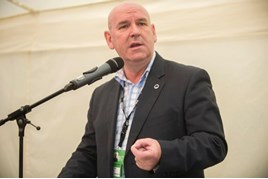“Never, in my four decades working in the railway industry, have I dealt with a group of people so deceitful.”
That was the message from ASLEF General Secretary Mick Whelan, delivered from the Rail Live stage on June 19.
Whelan cited rail investment in Spain, and asked for any future government to “put the wheels of steel back together, end fragmentation, and start thinking about a joined-up strategy that enables us to build a railway fit for the future”.
On Great British Railways, he said: “One area where it can make a real change is the fare structure. As it currently stands, it is far too complicated, fragmented, and a victim of privatisation.
“Under a one-fare structure, if you wanted to grow a certain area, trial different fares for different sectors - you have that opportunity. It has other benefits for productivity and accountability. GBR is hopefully a beginning of putting the wheels of steel back together.”
Reiterating his desire for the strikes to end in the coming months, Whelan labelled Prime Minister Rishi Sunak’s government as the most disingenuous people he had ever worked with.
“We’re not the problem in this dispute. I am confident of that. Every time we have gone to the table for discussions it is with a genuine desire to end the strikes. I can’t say the same about the government,” he said.
ASLEF has been in dispute with the government for nearly two years, regarding driver pay and overtime working.
Whelan, who is a member of Labour’s National Executive Committee, laid the blame firmly at the door of the government, declaring: “The problem we have is that we have a rather antagonistic government, who under the guise of reform doesn’t want to give us a pay rise and who hasn’t given us a pay rise for five years, and who also at the same time expects us to give up 150 years of conditions, every national and local agreement and the right to negotiate for ourselves in the future, which is rather a strange thing for a trade union to do as we might as well as put the locks on the doors and go home.”
While the hope is that the strikes could end if Labour forms the new government (the General Election took place after this issue of RAIL went to press), there is no guarantee that it will have the money to spend, with other priorities demanding greater attention.
Whelan, however, remained optimistic: “One thing we haven’t done is talk resolution with the Labour Party - that wouldn’t be helpful at this stage. But I am hopeful that when July 5 or 6 comes around, I will get a phone call from Louise Haigh (Shadow Transport Secretary) asking if we can find a way through this.”
And one area where Whelan believes Labour would make a difference is in determining a long-term plan for rail to help alleviate “the drift” seen under the current government.
Looking past the strike issue, and discussing whether nationalisation could make a difference, Whelan told the Rail Live audience: “The one thing I’ve seen over my career is that we seem to go from government to government every five years with different investment strategies.”















Login to comment
Comments
No comments have been made yet.